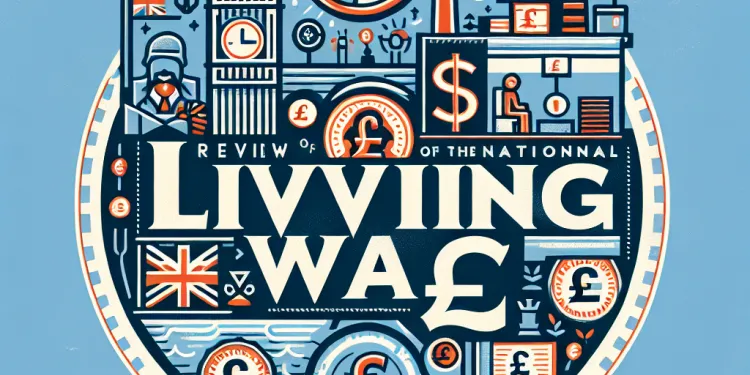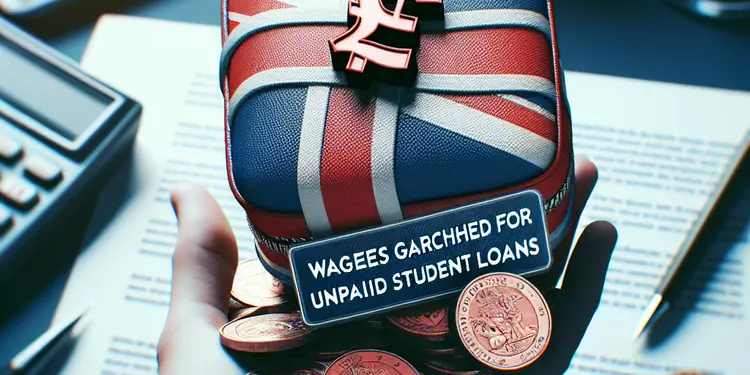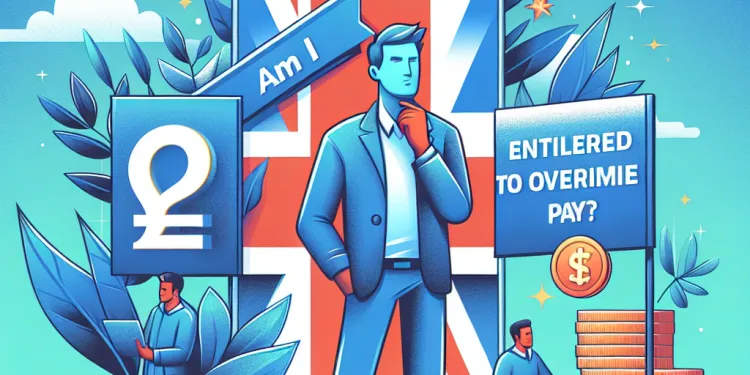
Find Help
More Items From Ergsy search
-

What happens if an employer pays below the National Living Wage?
Relevance: 100%
-

Are employers legally required to pay the National Living Wage?
Relevance: 86%
-

Is the Living Wage Foundation's rate the same as the National Living Wage?
Relevance: 71%
-

UK national living wage increase 2026
Relevance: 70%
-

How is the National Living Wage calculated?
Relevance: 68%
-

Who is eligible for the National Living Wage?
Relevance: 68%
-

How does the National Living Wage differ from the National Minimum Wage?
Relevance: 68%
-

Why is the National Living Wage being increased?
Relevance: 67%
-

What is the new UK National Living Wage for 2026?
Relevance: 66%
-

Are apprentices entitled to the National Living Wage?
Relevance: 65%
-

How often is the National Living Wage reviewed?
Relevance: 64%
-

Are zero-hour contract workers entitled to the National Living Wage?
Relevance: 64%
-

How can I calculate my new earnings based on the National Living Wage increase?
Relevance: 61%
-

Where can I find official announcements on the National Living Wage?
Relevance: 61%
-

How does the UK National Living Wage compare internationally?
Relevance: 61%
-

Will the increase in the National Living Wage affect inflation?
Relevance: 54%
-

How often do wage rates change in the UK?
Relevance: 44%
-

Does the National Living Wage increase mean my taxes will change?
Relevance: 40%
-

What should I do if my employer does not pay the new National Living Wage?
Relevance: 37%
-

Do I need to pay tax on the £500 cost of living payment?
Relevance: 34%
-

Does the HMRC Employer Bulletin cover changes in employment law?
Relevance: 32%
-

Can my wages be garnished for unpaid student loans?
Relevance: 31%
-

Do gig workers have the right to a minimum wage?
Relevance: 31%
-

How might these changes affect taxpayers on PAYE?
Relevance: 31%
-

Boost your Take Home Pay | Salary Sacrifice Explained UK
Relevance: 29%
-

Where can I find reviews from current or past National Trust employees?
Relevance: 29%
-

Is the HMRC Employer Bulletin relevant for small businesses?
Relevance: 28%
-

Does the HMRC Employer Bulletin provide guidance on compliance?
Relevance: 28%
-

What if I have gaps in my National Insurance record?
Relevance: 27%
-

Is there a change in National Insurance rates for 2026?
Relevance: 27%
-

Are there seasonal jobs with the National Trust?
Relevance: 26%
-

Am I entitled to overtime pay as a gig worker?
Relevance: 26%
-

Do gig workers have the right to transparency in pay and fees?
Relevance: 26%
-

When will the new National Living Wage come into effect?
Relevance: 26%
-

Employment Tribunal Cases Surge Amidst Gig Economy Debate
Relevance: 25%
-

Do National Trust employees receive any benefits?
Relevance: 25%
-

What are National Trust Jobs?
Relevance: 24%
-

Can the HMRC Employer Bulletin help with payroll management?
Relevance: 24%
-

What is the HMRC Employer Bulletin?
Relevance: 24%
-

Do National Trust jobs require travel?
Relevance: 24%
Understanding the National Living Wage
The National Living Wage (NLW) is a mandatory minimum wage set by the UK government that all employers must pay to employees over a certain age. As of April 2023, the age threshold for the NLW is 23 and over, aligning the NLW with strategies to increase pay fairness across different age groups. The rate of the NLW is subject to annual review and can change based on economic factors and government policy objectives.
Legal Implications for Employers
Employers in the UK are legally obliged to pay their workers the NLW, ensuring fair compensation that reflects the cost of living. Failure to comply with this requirement can have serious legal ramifications. When an employer fails to pay at least the NLW, they are in breach of the terms of the National Minimum Wage Act 1998. This breach can lead to legal actions, financial penalties, and significant reputational damage to the business.
Financial Consequences
If an employer is found to be paying below the NLW, they may be subject to back payments and fines. The employer will be required to compensate their workers for the shortfall, backdating these payments as necessary to cover the period of underpayment. In addition to paying arrears, employers may incur fines of up to 200% of the underpayment, with a maximum fine of £20,000 per worker. Moreover, deliberate neglect or refusal to comply could lead to prosecution.
Enforcement and Compliance Checks
The responsibility for enforcement lies with HM Revenue and Customs (HMRC), which conducts regular checks on businesses to ensure compliance with NLW rules. The HMRC has the authority to investigate complaints, conduct reviews, and impose penalties where necessary. Employers must keep accurate and up-to-date records of payments to demonstrate compliance, which they must present if audited by HMRC.
Impact on Employees
Employees who are not receiving the NLW have the right to lodge a complaint with their employer or take the issue straight to HMRC, who will investigate on their behalf. It is vital for employees to be aware of their rights under this law to ensure they receive fair compensation for their work. There are also protections in place to prevent employees from experiencing retaliatory actions from their employers if they challenge underpayment issues.
Reputation and Business Consequences
Beyond legal and financial repercussions, paying below the NLW can severely damage an organization's reputation. Businesses might be publicly named and shamed by the government if found to be in violation, deterring potential customers and employees. This negative publicity can have long-lasting effects on future recruitment and business opportunities, underscoring the importance of adhering to NLW regulations.
Understanding the National Living Wage
The National Living Wage (NLW) is the least money you can be paid per hour if you are working in the UK and are aged 23 or older. It is set by the UK government. Every year, they check and might change it. This is to make sure people get fair pay.
Legal Implications for Employers
If you own a business in the UK, you must pay your workers at least the NLW. This is the law. If you don't, you can get into big trouble. You could face court action, fines, and harm to your business's good name.
Financial Consequences
If a business pays less than the NLW, they might have to pay the workers back and could face fines. They owe the workers any missing money, and the fines can be up to twice the unpaid amount, but no more than £20,000 for each worker. If someone ignores the law on purpose, they can face legal charges.
Enforcement and Compliance Checks
HM Revenue and Customs (HMRC) checks that businesses pay the right amount. They look into complaints and can punish businesses that break the rules. Businesses have to keep proof of payments to show HMRC if asked.
Impact on Employees
If you are not getting the NLW, you can complain to your boss or report it to HMRC. HMRC will look into it for you. It’s important to know your rights so you get paid fairly. The law also protects you from getting into trouble with your boss if you report underpayment.
Reputation and Business Consequences
Not paying the NLW can make your company look bad. The government might name companies that break the rules. This can make people not want to work with or buy from these businesses. Keeping a good name is one reason to follow the law about NLW.
Frequently Asked Questions
What is the National Living Wage?
The National Living Wage is the minimum pay per hour almost all workers are entitled to in the UK, depending on their age.
What happens if an employer pays below the National Living Wage?
If an employer pays below the National Living Wage, they are breaking the law, and employees can take action to claim the shortfall.
How can employees check if they are receiving the National Living Wage?
Employees can use the government's online wage calculator or review their pay slips to ensure they're receiving at least the National Living Wage.
What can an employee do if they are paid below the National Living Wage?
An employee can complain to their employer, seek help from a trade union, or report the issue to HMRC.
Can the employer face penalties for paying below the National Living Wage?
Yes, employers can face penalties such as fines and being required to pay employees the money they're owed.
Who enforces the National Living Wage?
HMRC (Her Majesty's Revenue and Customs) enforces the National Living Wage in the UK.
Can an employee be dismissed for complaining about not receiving the National Living Wage?
No, it's illegal for an employer to dismiss an employee for asserting their right to the National Living Wage.
Does the National Living Wage apply to all workers?
The National Living Wage applies to most workers aged 23 and over, but there are different rates for younger workers and apprentices.
Can an employer backdate pay to make up for underpayment of the National Living Wage?
Yes, an employer must backdate any underpayments to cover the difference between what was paid and the correct National Living Wage.
What is the penalty for employers not complying with the National Living Wage?
Employers can be fined up to 200% of the underpayments they owe, up to a maximum of £20,000 per worker.
Are part-time workers entitled to the National Living Wage?
Yes, part-time workers are entitled to the same National Living Wage as full-time workers.
Do self-employed people qualify for the National Living Wage?
No, self-employed individuals are not entitled to the National Living Wage.
How can an employer rectify paying below the National Living Wage?
The employer must pay the difference owed and ensure future compliance with the wage law.
Can an employee take legal action if paid below the National Living Wage?
Yes, employees can take their case to an employment tribunal if they are not paid the correct wage.
What should an employee do if their employer refuses to pay the National Living Wage?
They can report the employer to HMRC, seek advice from Acas, or take the matter to an employment tribunal.
Does the National Living Wage increase annually?
Yes, the National Living Wage is subject to change each April as recommended by the Low Pay Commission.
Can a worker get back pay if they discover they were underpaid the National Living Wage?
Yes, workers can claim back pay for the difference between what they were paid and the National Living Wage they were owed.
Is it mandatory for employers to display the current National Living Wage rate?
While not mandatory, it is good practice for employers to inform employees of current wage rates and any changes.
What happens if an employee is paid less because they are in training?
Even employees in training must receive the correct wage for their age group, unless they are in an apprenticeship.
How does the National Living Wage affect workers paid by commission?
The total pay from commission and base salary must at least equal the National Living Wage for the hours worked.
What is the National Living Wage?
The National Living Wage is the lowest amount of money workers must get paid. It is like a rule for jobs to make sure people get enough money.
Workers over a certain age must get at least the National Living Wage. It helps people buy the things they need.
If you want help reading, you can ask someone to read with you. You can also use tools that read the words out loud. This can make it easier to understand.
The National Living Wage is the smallest amount of money workers in the UK must be paid for each hour of work. This can change depending on how old they are.
What if a boss pays less than the National Living Wage?
Sometimes, a boss might not pay workers the right amount of money. In the UK, there is a rule about the least amount of money you must get paid for your work. This is called the National Living Wage.
If a boss pays less than this amount, they are breaking the law. If this happens, you can:
- Tell someone in charge, like a manager or a union.
- Contact a helpline for help and advice.
- Write down how many hours you worked and how much you got paid. This will be good to show someone.
You have the right to get paid at least the National Living Wage.
If a boss doesn't pay the right amount called the National Living Wage, they are breaking the rules. Workers can do something about it to get the money they are missing.
How can workers check if they get the National Living Wage?
Here is how you can check if you get the right pay:
1. Look at your pay slip: Your pay slip shows how much money you get for your work. Ask someone to help you find your pay slip if you need help.
2. Know the National Living Wage rate: Find out the amount of money the law says you should get. This is called the National Living Wage.
3. Check your age: The National Living Wage depends on how old you are. Make sure you know your age rate. You can check a website for the latest rates or ask an adult.
4. Use a calculator: You can use an online tool to help you check your pay. Ask someone to help you use it.
If you need help, ask a manager, a parent, or use an online chat tool for workers for more support.
Workers can use the government's online pay checker or look at their pay slips to make sure they are getting at least the National Living Wage.
What can a worker do if they get paid less than the National Living Wage?
If someone is not getting enough money from work, they can:
- Talk to their boss and ask for more money.
- Ask someone to help them check their pay.
- Contact a place like a Citizen's Advice Bureau for help.
Tools that can help:
- A calculator to check pay.
- Websites with information about the National Living Wage.
A worker can tell their boss if something is wrong. They can also ask a group called a trade union for help, or let HMRC know about the problem.
Can an employer get in trouble for paying less than the National Living Wage?
If an employer pays less than the National Living Wage, they can get in trouble. They might have to pay extra money back to the workers. They might have to pay a fine.
People can use a calculator or ask for help to check if they are getting paid the right amount. You can talk to someone you trust or look online for more information.
Yes, bosses can get in trouble. They might have to pay a fine. They might also have to give their workers the money they owe them.
Who makes sure people get the National Living Wage?
HMRC is a group in the UK. They make sure people get the right pay called the National Living Wage.
Can a worker be fired for complaining about not getting the National Living Wage?
If a worker talks about not getting the right pay, can they lose their job?
This question is about whether it's okay to fire someone for saying they are not getting enough money.
It is important to know the rules about pay and work. Ask your boss or someone who helps with worker rights if you have questions.
You can use tools like picture charts or speaking apps to help understand these ideas better.
No, a boss cannot fire a worker for asking to get paid the National Living Wage. It is against the law.
Do all workers get the National Living Wage?
The National Living Wage is the money that most workers aged 23 and over must get paid for their work. There are different amounts for younger workers and people who are learning a job as apprentices.
Can a boss pay you extra later if they didn't pay you the right wage at first?
Yes, if a boss did not pay enough, they must pay the right amount. They must pay the difference between the old payment and the correct amount according to the National Living Wage.
If you have trouble reading this, you can use tools like text-to-speech apps. They read the text out loud for you. You can also ask someone you trust to help explain the words.
What happens if bosses do not pay the National Living Wage?
If bosses do not pay the right wages, they can get in trouble. Tools like talking to a helper or using a calculator can make sure everyone gets paid fairly.If a boss doesn't pay the right amount, they can get in big trouble. They might have to pay double the money they owe to a worker. The most they can owe for each person is £20,000.
Do part-time workers get the National Living Wage?
If you work part-time, you should still get the National Living Wage. This is the law.
You can check if you get the right pay with these steps:
- Look at your pay slip to see how much you earn.
- Use an online wage calculator if you need help.
- Ask a friend or family member to help you understand.
Yes, people who work part-time must get the same National Living Wage as people who work full-time.
Can self-employed people get the National Living Wage?
If you work for yourself, you are called self-employed. This means you have your own business or work on your own.
The National Living Wage is money that workers must be paid. It is the law for people who work for a company.
But if you are self-employed, you do not have to get paid the National Living Wage. You decide how much money you earn.
Here are some tips if you are self-employed:
- Make a plan for your money. Decide how much you need for food, rent, and other things.
- Use a notebook or app to keep track of your money. Write down what you earn and what you spend.
- Get help if you need it. Talk to someone who knows about money or business.
No, people who work for themselves do not get the National Living Wage.
What can a boss do if they pay less than the National Living Wage?
If a boss pays someone less money than the National Living Wage, they need to fix it.
Here are steps to make it right:
- Check: Look at how much money everyone gets.
- Pay more: Give extra money to match the right amount.
- Keep checking: Make sure to pay the right amount in the future.
Tools to help:
- Calculator: Use a tool online to check wages.
- Help from others: Ask a friend, family, or a special helper for advice.
The boss must pay the missing money and make sure they follow pay rules next time.
Can a worker get help if their pay is too low?
If you are not getting paid enough money, you can ask for help.
The law says you must get at least the National Living Wage. This is the smallest amount of money that workers must be paid for their work.
If you think you are getting paid too little, tell your boss first.
If your boss does not help, you can talk to a person who knows about the law. This person can help you make sure you get the right pay.
You can also ask someone you trust to help you. This could be a friend or family member.
If reading is hard, you can ask someone to read with you or use an app that reads out loud.
If workers do not get paid the right amount of money, they can ask for help from a special work court. This is called an employment tribunal.
What can you do if your boss does not pay you enough money?
If your boss does not pay you the right amount of money, there are things you can do:
- Talk to your boss: Ask your boss why you are not getting enough money. Maybe there is a mistake.
- Check your pay: Make sure you know how much money you should get. Look online or ask someone you trust.
- Ask for help: You can ask a friend or a family member for help.
- Contact a helpline: There are places you can call to get advice. They can help you know what to do next.
Remember, you have the right to be paid the right amount of money for your work.
You can tell HMRC about the employer. You can ask Acas for help. Or you can go to an employment tribunal to solve the problem.
Does the National Living Wage go up every year?
Yes, the National Living Wage can change every April. The Low Pay Commission helps decide if it should change.
Can a worker get money back if they find out they were not paid the right amount?
If a worker finds out they were not paid enough money, they can ask for the missing money. Make sure you check your pay and ask for help if you need it.
Here are some things that can help you:
- Talk to your boss and ask about your pay.
- Use a calculator to check if your pay is correct.
- Ask someone you trust to help you understand your pay slip.
- Contact a group that helps workers know their rights, if you need more help.
Yes, workers can get back the money they were owed if they were not paid the right amount. The right amount is called the National Living Wage.
Do bosses have to show the National Living Wage rate?
This question is asking if employers need to put up or show the current National Living Wage rate where workers can see it.
To help understand, you can:
- Ask someone to explain it in simple words.
- Look for pictures or videos that talk about the National Living Wage.
- Use an app or tool that reads questions out loud.
It is a good idea for bosses to tell workers how much they will get paid and if it changes.
What if a worker gets less money because they are learning?
If you are learning a new job, you might get less money.
But there are rules that say how much money you should get.
If you think you are not getting enough money, ask for help.
You can talk to someone you trust or use a computer tool to find out more.
People who are still learning on the job must get paid the right amount for how old they are, unless they are doing an apprenticeship.
How does the National Living Wage affect workers paid by commission?
The National Living Wage is the lowest money a boss can pay a worker for their time. It is the law.
Some workers earn money with commission. This means they get extra money for selling things.
Bosses must make sure that, even with commission, workers get at least the National Living Wage for the hours they work.
If a worker’s pay is less than the National Living Wage, the boss has to pay more to meet the law.
Use a calculator online to see if you are getting the right money. Ask someone you trust if you need help.
The money you get from your job, including bonuses and your regular pay, must be at least the same as the National Living Wage for the hours you work.
Useful Links
Have you found an error, or do you have a link or some information you would like to share? Please let us know using the form below.
-->
This website offers general information and is not a substitute for professional advice.
Always seek guidance from qualified professionals.
If you have any medical concerns or need urgent help, contact a healthcare professional or emergency services immediately.
Some of this content was generated with AI assistance. We’ve done our best to keep it accurate, helpful, and human-friendly.
- Ergsy carfully checks the information in the videos we provide here.
- Videos shown by Youtube after a video has completed, have NOT been reviewed by ERGSY.
- To view, click the arrow in centre of video.
- Most of the videos you find here will have subtitles and/or closed captions available.
- You may need to turn these on, and choose your preferred language.
- Go to the video you'd like to watch.
- If closed captions (CC) are available, settings will be visible on the bottom right of the video player.
- To turn on Captions, click settings .
- To turn off Captions, click settings again.
More Items From Ergsy search
-

What happens if an employer pays below the National Living Wage?
Relevance: 100%
-

Are employers legally required to pay the National Living Wage?
Relevance: 86%
-

Is the Living Wage Foundation's rate the same as the National Living Wage?
Relevance: 71%
-

UK national living wage increase 2026
Relevance: 70%
-

How is the National Living Wage calculated?
Relevance: 68%
-

Who is eligible for the National Living Wage?
Relevance: 68%
-

How does the National Living Wage differ from the National Minimum Wage?
Relevance: 68%
-

Why is the National Living Wage being increased?
Relevance: 67%
-

What is the new UK National Living Wage for 2026?
Relevance: 66%
-

Are apprentices entitled to the National Living Wage?
Relevance: 65%
-

How often is the National Living Wage reviewed?
Relevance: 64%
-

Are zero-hour contract workers entitled to the National Living Wage?
Relevance: 64%
-

How can I calculate my new earnings based on the National Living Wage increase?
Relevance: 61%
-

Where can I find official announcements on the National Living Wage?
Relevance: 61%
-

How does the UK National Living Wage compare internationally?
Relevance: 61%
-

Will the increase in the National Living Wage affect inflation?
Relevance: 54%
-

How often do wage rates change in the UK?
Relevance: 44%
-

Does the National Living Wage increase mean my taxes will change?
Relevance: 40%
-

What should I do if my employer does not pay the new National Living Wage?
Relevance: 37%
-

Do I need to pay tax on the £500 cost of living payment?
Relevance: 34%
-

Does the HMRC Employer Bulletin cover changes in employment law?
Relevance: 32%
-

Can my wages be garnished for unpaid student loans?
Relevance: 31%
-

Do gig workers have the right to a minimum wage?
Relevance: 31%
-

How might these changes affect taxpayers on PAYE?
Relevance: 31%
-

Boost your Take Home Pay | Salary Sacrifice Explained UK
Relevance: 29%
-

Where can I find reviews from current or past National Trust employees?
Relevance: 29%
-

Is the HMRC Employer Bulletin relevant for small businesses?
Relevance: 28%
-

Does the HMRC Employer Bulletin provide guidance on compliance?
Relevance: 28%
-

What if I have gaps in my National Insurance record?
Relevance: 27%
-

Is there a change in National Insurance rates for 2026?
Relevance: 27%
-

Are there seasonal jobs with the National Trust?
Relevance: 26%
-

Am I entitled to overtime pay as a gig worker?
Relevance: 26%
-

Do gig workers have the right to transparency in pay and fees?
Relevance: 26%
-

When will the new National Living Wage come into effect?
Relevance: 26%
-

Employment Tribunal Cases Surge Amidst Gig Economy Debate
Relevance: 25%
-

Do National Trust employees receive any benefits?
Relevance: 25%
-

What are National Trust Jobs?
Relevance: 24%
-

Can the HMRC Employer Bulletin help with payroll management?
Relevance: 24%
-

What is the HMRC Employer Bulletin?
Relevance: 24%
-

Do National Trust jobs require travel?
Relevance: 24%


